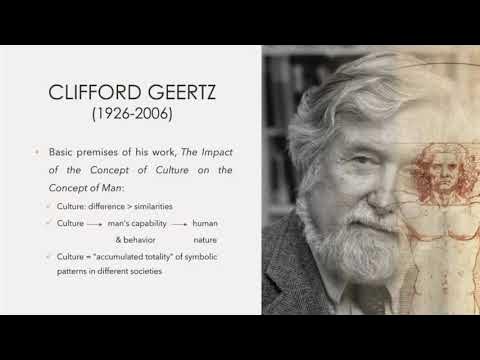Video Pembelajaran #18 "Sosiologi Budaya"
Summary
TLDRThis lecture introduces the Sociology of Culture, discussing various definitions of culture in both sociology and anthropology. It explores the historical evolution of cultural studies, focusing on how culture was initially seen as a unifying force within society, evolving into a key independent variable in sociological analysis. The speaker contrasts the 'sociology of culture' with the 'sociology of culture' and explains the shift towards a more dynamic view where culture drives social processes. The lecture highlights key scholars and invites students to explore further readings to deepen their understanding of culture's role in society.
Takeaways
- 😀 The lecture is an introduction to the subject of 'Sociology of Culture,' focusing on how sociologists understand culture from various perspectives.
- 😀 Culture is defined as the creation of human work and knowledge, influenced by figures like Selo Soemardjan and Clifford Geertz.
- 😀 In classical sociology, culture is seen as a unifying force that helps bind a society together, as emphasized by Émile Durkheim.
- 😀 Sociology of culture, in the classical sense, uses a sociological lens to analyze cultural phenomena as dependent variables.
- 😀 The emergence of 'cultural sociology' shifts the focus, positioning culture as the central subject and not merely a dependent variable.
- 😀 Key thinkers in the evolution of cultural sociology, such as Jeffrey Alexander and others, promoted a more autonomous view of culture as the driving force of society.
- 😀 There is a distinction between 'sociology of culture' and 'cultural sociology'—the former uses sociological frameworks to study culture, while the latter treats culture as the central element of analysis.
- 😀 The development of culture studies in the 1960s and 1970s played a significant role in expanding the academic discourse on culture and society.
- 😀 Culture sociology has evolved beyond a passive study of culture to an active exploration of how culture shapes social dynamics, with a focus on high description and cultural analysis.
- 😀 The course is designed to explore the flexibility of the 'sociology of culture' and its practical implications, encouraging students to engage critically with texts and ideas from major scholars in the field.
Q & A
What is the primary distinction between 'Sosiologi Kebudayaan' and 'Sosiologi Budaya'?
-'Sosiologi Kebudayaan' (Sociology of Culture) treats culture as a dependent variable, analyzed through sociological perspectives. In contrast, 'Sosiologi Budaya' (Cultural Sociology) treats culture as an independent variable, making it the primary focus of sociological analysis.
How does Émile Durkheim define culture in the context of sociology?
-Émile Durkheim views culture as a force that binds society together, helping to maintain social order and cohesion. He emphasizes that culture enables shared understanding and collective consciousness within a society.
What role does culture play in the sociology of culture?
-In the sociology of culture, culture is considered a dependent variable that is shaped by social structures and is used to analyze and understand social phenomena. Culture serves as a tool to interpret and explain societal behaviors.
How has the perspective on culture evolved in sociology from the 1960s onwards?
-From the 1960s onwards, cultural studies within sociology evolved to recognize culture not just as an object of study but as a central force shaping social processes. Cultural sociology emerged, emphasizing that culture itself drives societal change and interaction, rather than just being an outcome of social forces.
Who are some of the key figures in the development of cultural sociology?
-Key figures in the development of cultural sociology include Émile Durkheim, Pierre Bourdieu, Jeffrey Alexander, and Clifford Geertz. These scholars contributed significantly to understanding how culture influences and shapes social life.
What is meant by 'culture as a 'machine' in the context of cultural sociology?
-In cultural sociology, culture is often described as a 'machine,' meaning it functions as a powerful, independent force that drives social processes. Unlike in sociology of culture, where culture is treated as an element dependent on other social factors, in cultural sociology, culture itself is the primary engine of social dynamics.
What is the significance of the term 'cultural studies' in the development of sociology?
-Cultural studies, particularly from the 1960s onwards, played a key role in shifting the focus of sociology to the centrality of culture in social analysis. It broadened the scope of sociology, incorporating a more nuanced understanding of culture as a driving force in shaping social life.
What does 'high description' mean in the context of cultural sociology?
-In cultural sociology, 'high description' refers to a detailed, rich interpretation of cultural phenomena. It involves closely analyzing cultural practices, symbols, and social behaviors, often in a way that reveals deeper meanings about society.
What is the difference between a 'strong program' and a 'weak program' in cultural sociology?
-A 'strong program' in cultural sociology emphasizes in-depth analysis and engagement with cultural practices, viewing culture as a dominant force in social processes. A 'weak program' refers to a more traditional approach, treating culture as a dependent variable or secondary factor in sociological analysis.
Why is the distinction between 'Sosiologi Kebudayaan' and 'Sosiologi Budaya' important in sociology?
-The distinction is important because it clarifies whether culture is being treated as a variable to understand other social phenomena ('Sosiologi Kebudayaan') or as the central driving force in social dynamics ('Sosiologi Budaya'). This distinction shapes how sociologists approach and interpret cultural and social processes.
Outlines

This section is available to paid users only. Please upgrade to access this part.
Upgrade NowMindmap

This section is available to paid users only. Please upgrade to access this part.
Upgrade NowKeywords

This section is available to paid users only. Please upgrade to access this part.
Upgrade NowHighlights

This section is available to paid users only. Please upgrade to access this part.
Upgrade NowTranscripts

This section is available to paid users only. Please upgrade to access this part.
Upgrade Now5.0 / 5 (0 votes)





